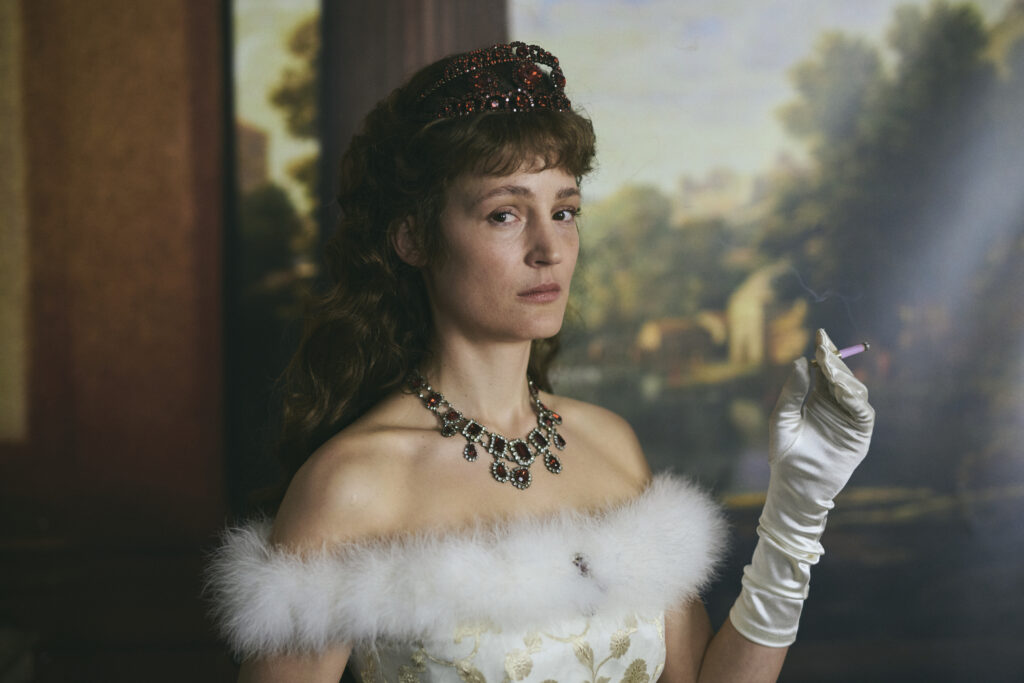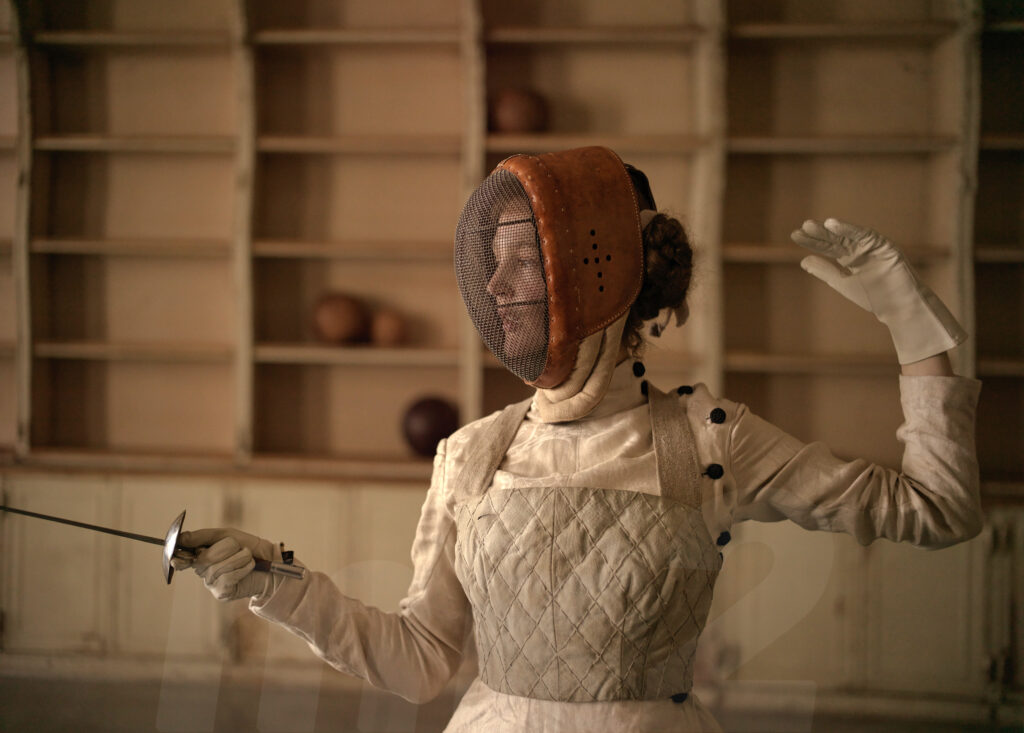May 6, 2023
by Carla Hay

Culture Representation: Taking place in Austria, Hungary, England and Germany, in 1877 and 1878, the dramatic film “Corsage” (based on the life of Empress Elisabeth of Austria) features an all-white group of people representing the working-class, middle-class and royalty.
Culture Clash: As she nears her 40th birthday, Empress Elisabeth feels neglected by a philandering husband and tries to rebel against a repressive environment that dictates her physical appearance, what she wears, and how she raises her children.
Culture Audience: “Corsage” will appeal primarily to people who are fans of history-based biopics but viewers should be prepared to see a story that is more downbeat than uplifting.

“Corsage” is gorgeously filmed and woefully depressing with glimmers of playful sarcasm about royal culture. Vicky Krieps gives a memorable performance as Empress Elisabeth of Austria, but this drama won’t appeal to anyone looking for a fun-filled story. “Corsage” had its world premiere at the 2022 Cannes Film Festival, where Krieps won a Best Performance award in the festival’s Un Certain Regard competition. “Corsage” also screened at other film festivals in 2022, including the New York Film Festival.
Written and directed by Marie Kreutzer, “Corsage” takes place in 1877 and 1878, mostly in the Austrian city of Vienna and the Hungarian city of Budapest. Empress Elisabeth, nicknamed Sissi, was also queen of Hungary. The movie, which changes some real-life facts, gives an up-close and sometimes disturbing personal look at the life Elisabeth, who seems to be living a charmed life in the public eye. In private, things are quite different for the empress, who is fretting about soon turning 40, her physical appearance, and her crumbling marriage.
Elisabeth says in a voiceover: “From the age of 40, a person begins to disperse and fade.” (Keep in mind, this is during an era when the average life expectancy was much lower than it is today.) From the first 10 minutes of the movie, it’s made clear that Elisabeth is deeply troubled and has self-esteem issues.
One of the things that she does on a regular basis (as shown in an early scene in the movie) is hold her breath underwater in a bathtub for as long as possible. The first time the movie shows her engaging in this dangerous stunt, she’s held her breath underwater for 40 seconds. She’s clearly not doing this for daredevil fun. It’s an obvious cry for help, because her life is making her miserable.
Elisabeth’s husband Franz Joseph I of Austria (played by Florian Teichtmeister) is inattentive and cold toward her. He seems bored with their marriage. Franz Joseph (who wears a fake beard and a hairpiece) won’t even let Elisabeth eat dinner with him. And when Elisabeth tries to be sexually intimate with Franz Joseph, he’s not interested. Later, Elisabeth sees Franz Joseph being affectionate with another woman. It just confirms what she probably knew already: Franz Joseph has been unfaithful to her.
Elisabeth and Franz Joseph have a daughter together named Valerie (played by Rosa Hajjaj), who’s about 7 or 8 years old, and a son named Rudolph (played by Aaron Friesz), who is in his early 20s. Franz Joseph and Elisabeth had another daughter named Sophie, who died years ago and would have been 22 years old in 1847. As a couple, Elisabeth and Franz Joseph do not talk about Sophie, but it’s implied that Sophie’s death has taken a toll on their marriage. In real life, Sophie died in a fire in 1897, which was 20 years after the story in this movie takes place.
Elisabeth feels so neglected, when she’s in public, she pretends to faint, just so she can get the type of attention that a royal woman would get when she faints. She does this phony fainting after getting out of a carriage during a visit to King Ludwig II of Bavaria (played by Manuel Rubey). Later, she tells King Ludwig II in a private conversation that her fainting spell was all an act. And she shows him how she does it.
One of Elisabeth’s concerns is how she is covered by the tabloid media. There have been reports that she’s been trying to lose weight. These reports are true. “Corsage” has several scenes where Elisabeth’s weight and diet are obsessively monitored by Elisabeth and many of the people around her. Observant viewers will notice that not much has changed with today’s tabloid media outlets, which give obsessive coverage to the physical appearance (including any weight loss or weight gain) of young and famous royal women.
In her spare time, Elisabeth does fencing and horse-riding activities. The movie shows how Elisabeth impulsively orders Valerie to ride horses with her in the early-morning hours. As a result, Valerie gets sick. Franz Joseph blames Elisabeth for Valerie’s illness, and it causes further strain in their marriage. Franz Joseph wants to make Elisabeth feel like she’s an unfit mother.
Elisabeth’s closest confidante is Ida Ferenczy (played by Jeanne Werner), a Hungarian lady-in-waiting for Elisabeth. Elisabeth is also close with another lady-in-waiting Marie Festetics (played by Katharina Lorenz), who keeps meticulous diaries of what her royal employer does. Also in Elisabeth’s inner circle is her hair stylist Fanny Feifalik (played by Alma Hasun), who is in for a shock after Elisabeth cuts off her own long hair during an emotional fit. It says a lot about Elisabeth and that her closest friends were also her servants.
Elisabeth also has some male friends, one of whom becomes her love interest. She and a younger man named Bay Middleton (played by Colin Morgan) have a mutual attraction. Elisabeth’s son Rudolph expresses concern to her that people are gossiping about how much time she spends alone with Bay. Elisabeth also strikes up a friendship with French cinematographer Louis Le Prince (played by Finnegan Oldfield), who makes short films with her. (In real life, Le Prince is considered the “godfather” of cinematography.)
“Corsage” has a very revisionist take on the real Elisabeth’s life, including how she died. The movie portrays her as possibly manic depressive but with a mischievous streak. She likes to flip her middle finger or stick her tongue out at people when she’s displeased about something. And in an era where it was considered not very ladylike to smoke cigarettes, Elisabeth was a chronic smoker.
Under the astute direction of Kreutzer, “Corsage” delivers everything that viewers might expect of a drama about European royalty: sumptuous costumes, luxurious production design, and elite characters talking as if they’re always breathing rarefied air. However, this admittedly stuffy movie can just as easily be a turnoff to viewers who won’t feel any emotional connection to these characters at all. Krieps gives a compelling performance, but Elisabeth’s self-destructive tendencies becomes a bit draining to watch.
One of the movie’s highlights is the musical score by Camille. It’s haunting and enchanting in all the right ways. “Corsage” is a cautionary tale told in an “all that glitters is not gold” manner. It’s a story that is about a specific royal woman, but it can apply to anyone who is living a restrictive and unhappy existence, even if that life might look privileged and wonderful on the outside.
IFC Films released “Corsage” in select U.S. cinemas on December 23, 2022. The movie was released on digital and VOD on February 7, 2023.




